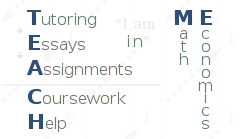Section 1.2: Problem 4 Solution
Working problems is a crucial part of learning mathematics. No one can learn... merely by poring over the definitions, theorems, and examples that are worked out in the text. One must work part of it out for oneself. To provide that opportunity is the purpose of the exercises.
James R. Munkres
Show that the following hold:
(a)
iff
.
(b)
iff
.
(Recall that
, the set together with the one possibly new member
.)
Note: formally we would have to consider truth assignments that use symbols from the formulas on both sides of
only. You can either assume that this is the case without explicitly saying that, or use Exercise 6(b) to see that this is not so important.
(a) (
) iff (for every truth assignment
that satisfies
it also satisfies
) iff (for every truth assignment
that satisfies
if
then
, i.e. the only case not possible is
and
) iff (for every truth assignment
that satisfies
,
) iff (
).
(b) (
) iff (for every truth assignment
,
iff
) iff (for every truth assignment
,
) iff (
).
